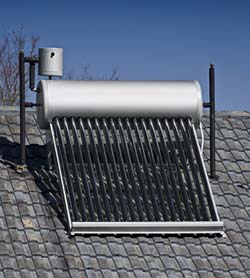For property owners there are many decisions to be made regarding your property. One such decision is whether or not to use a solar geyser or a heat pump as your property’s water heating system.

The number one benefit of using a solar geyser is that the energy is free and renewable. Using a solar geyser means it will continue heating water even on cold and cloudy days.
The first step in deciding which of these are suitable for you is to analyse the amount of water the system will need to provide, the space and budget available for the system and the architectural guidelines of the property or estate.
One other factor to be considered is the area in which the property warranting the installation is located. For example, if you have a holiday home with high humidity and excellent water quality, a heat pump is the suitable choice.
With South Africa’s mostly year round sunny climate, the option of a solar geyser can provide sufficient hot water, regardless of weather conditions and water quality.
Daniel Venter from Plumber Cape Town shares the following tips...
Advantages of a solar geyser
- The number one benefit of using a solar geyser is that the energy is free and renewable. Using a solar geyser means it will continue heating water even on cold and cloudy days.
- It decreases our dependence on fossil fuels and utilises renewable energy that would have otherwise been wasted.
- It avoids gas, smoke and any chemical by-products.
- The water quality does not influence the system.
- It does not rely on electricity to supply hot water so it benefits households that have no access to electricity.
- A solar geyser can save up to 90 percent of your family’s water heating costs.
- There are also many savings on ongoing costs as the solar geyser does not require a mains connection and reduces your electricity bill.
- The weather-resistant tubes have the ability to withstand hail and frost.
Disadvantages of a solar geyser
- High upfront investment and installation costs are the biggest disadvantage of solar geysers.
- Routine maintenance is needed, but only on the valves and not the system itself.
Advantages of a heat pump
- Easy installation on a residential and commercial level which requires no advanced plumbing work.
- It requires little space and can even be stored in your kitchen floor cupboard.
- It uses electricity, therefore you will be guaranteed to have hot water all day, every day.
Disadvantages of a heat pump
- Hard water needs to be treated with a water softening plant, resulting in high cost implications. Maintenance of the salt levels is essential to ensure the recharging of the ion exchange.
- The correct placement of a heat pump is essential to ensure sufficient savings. It needs to face north, east or west.
- Heat pumps are noisy and the noise level is measured at 50 decibels.
- A heat pump needs heat from the atmosphere to convert cold water to hot water.
- If the water quality is hard, the manufacturer will not provide a warranty.
- The system becomes less efficient if the hard water isn’t softened and the repairs will not be covered by warranty.
Heat pumps require a lot of maintenance and moving parts need to be changed. Maintenance work requires the skills of a qualified plumber or electrician.
What property owners should always remember with any installation is to use certified technicians. All tradesmen should be well trained and fully certified. Whoever you choose, be sure to check that all of their staff is trained to the highest standards and come fully registered to government accredited standards and carry all the necessary certifications.
Some companies offer rebates to customers when they switch to green energy. They have the option of getting the supplier to claim for the rebate on their behalf or paying the full installation price and claiming back for the rebate. Check with your supplier to find out the options available.








